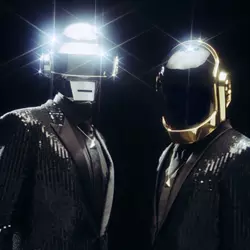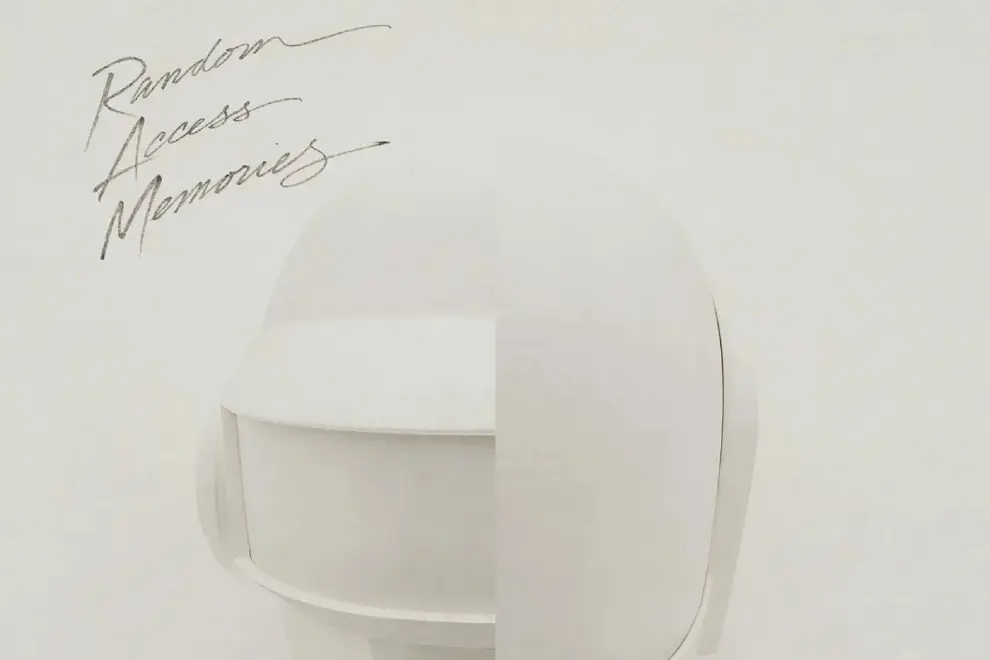 Daft Punk
Daft PunkThe news that OutKast's elusive André 3000 was dropping a surprise solo debut caused viral delirium – until hip-hoppers learnt that New Blue Sun would be experimental flute music. Daft Punk, who officially split in 2021, are doing something just as esoteric in issuing a drumless version of 2013's Random Access Memories (RAM) following the 10th Anniversary Edition. Again, the big question is, "Why?”
Like New Blue Sun, RAM (Drumless Edition) is for the curious – and it is randomly revealing.
Disillusioned indie rockers Daft Punk (Thomas Bangalter and Guy-Manuel de Homem-Christo) burst out in 1995 with the single Da Funk on Slam's Scottish Soma Records. They cultivated mystique – a vestige of the dance underground with its suspicion of image chicanery and cult of anonymity. Daft Punk signed to Virgin Records and delivered 1997's seminal Homework, ushering in 'French touch', less a genre than vibe or aesthetic.
In 2001, the eccentric Parisians, adopting robot personas and donning helmets, crossed over majorly with Discovery, led by the euphoric One More Time (featuring the late New Jersey legend Romanthony). House heads complained that they'd sold out.
Daft Punk deviated from filter house into techno with 2005's Human After All – bringing an iconic pyramid stage to Coachella (and Australia). They directed a sci-fi movie, Electroma, albeit with none of their own compositions.
Don't miss a beat with our FREE daily newsletter
Moving to a new label in Columbia, Daft Punk eventually rematerialised with RAM – their biggest and most ambitious album, the supporting cast including Pharrell Williams, Nile Rodgers, Giorgio Moroder, The Strokes frontman Julian Casablancas and Animal Collective's Panda Bear. It signalled a sonic departure, with Daft Punk forgoing samples and digital production in favour of live instrumentation in a quest for authenticity. They also pivoted from disco to vintage funk while delving back into Discovery's latent prog rock.
The lead single, Get Lucky, with Pharrell and Rodgers, was ubiquitous. But, not clubby, RAM received a muted response in dance circles. However, Daft Punk made history at the Grammy Awards, becoming the first electronic dance act to win 'Album Of The Year'. They didn't tour.
Alas, in 2021, the otherwise dormant Daft Punk dramatically announced their demise with the micro-film Epilogue, soundtracked by an alternative iteration of RAM's climatic Touch – Bangalter subsequently disclosing his existential anxieties about artificial intelligence to The BBC: "The last thing I would want to be, in the world we live in, in 2023, is a robot.”
Since then, the pair – who ventured out as producers in later years, notably collaborating with The Weeknd – have remained lowkey. Last year, Bangalter released a ballet score, Mythologies, and de Homem-Christo co-produced MODERN JAM on Travis Scott's UTOPIA. Reportedly, Daft Punk declined to reunite for the 2024 Paris Olympics Opening Ceremony.
But Daft Punk (and their label) have intuited that collective nostalgia – cue RAM (10th Anniversary Edition) with previously unreleased demos and outtakes.
Still, the notion of a Drumless Edition is quaint, considering Daft Punk's status as a dance act. Moreover, they worked on RAM with illustrious session drummers: John "JR" Robinson, who elevated Michael Jackson's Off The Wall, and Omar Hakin, a former member of the jazz fusion band Weather Report and credited on David Bowie's Let's Dance.
Inevitably, Daft Punk's faithful have speculated about the rationale for RAM (Drumless Edition). Some have assumed contractual obligations are a factor; others believe, benevolently, that, though not comprised of stems, RAM (Drumless Edition) is for musicians to play along to or DJ/producers to sample or remix – Daft Punk giving back to the culture. Plausibly, it's just idiosyncrasy.
As a 'non-remix' album, RAM (Drumless Edition) does have sonic – and emotional – value. Shedding drums and percussion exposes another dimension to the ballads and cinematic numbers with their lavish arrangements. Within (Drumless Edition), the earliest taster, is more delicate – secluding Canadian Chilly Gonzales' melodic piano. The Game Of Love sounds especially poignant with the robots' vocoder, while Beyond, distinguished by Greg Leisz's steel guitar, recalls Doobie Brother Michael McDonald's hip collabs with Grizzly Bear and Holy Ghost.
Drumless, RAM's zenith, Touch – sung by Paul Williams, who famously co-wrote Kermit The Frog's Rainbow Connection – has a numinous beauty with orchestration and choir, even if it loses its overall dynamism. Indeed, here, Touch is spacy, echoing Daft Punk's French contemporaries Air.
Nonetheless, the upbeat songs on RAM (Drumless Edition) often seem incomplete – like demos. Rodgers' groovy guitar is the life buoy keeping the previously cruisy Give Life Back To Music afloat. Without drums, Lose Yourself To Dance is distracting – the track, again featuring Pharrell and Rodgers, is never as magical as Get Lucky. And Casablancas' synth-rock Instant Crush (which Natalie Imbruglia incidentally covered on her 2015 album Male) lacks swagger.
The final surprise? Even sans beats, Contact is exhilarating – the banger, a throwback to the Discovery era, co-produced by DJ Falcon and sampling Sherbet's 1981 We Ride Tonight (yes, Daryl "The Horses" Braithwaite's original band).
RAM (Drumless Edition) isn't essential, but it's singular – and occasionally gorgeous. André should dig it.
Random Access Memories (Drumless Edition) is out now via Sony Music Australia/Columbia Records.
















